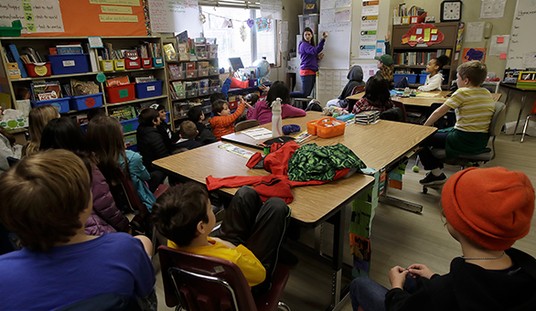“Hello hotline, is this the place that you can find out if a person is alive?”
A humanitarian gesture toward an enemy? A clever propaganda ploy? Or a way to end the war by pushing past Vladimir Putin’s efforts to hide the truths of his maniacal war crimes? Yes to all of the above, and perhaps almost as effective on all fronts. The Ukrainian government has set up a hotline in its besieged offices to share information on POWs and KIAs with Russian families who want to know what happened to their soldiers.
The calls are heartbreaking — and the reaction is precisely what one would expect, CNN reports:
Russian families are turning to a Ukrainian hotline in a desperate search for lost soldiers. @MarquardtA reports on recordings shared exclusively with CNN by the Ukrainian officials operating the hotline.
Read the full story: https://t.co/ij0KVrdQ2r pic.twitter.com/1AUfdj15CO
— CNN International PR (@cnnipr) March 8, 2022
Mothers and fathers, wives, siblings and others are engaged in a desperate search for their loved ones as Russia’s war with Ukraine extends seemingly without end. The shaky voices at the end of the line are not calling to search for Ukrainians, however — they are looking for information on Russian soldiers.
In recordings shared exclusively with CNN by the Ukrainian officials operating the hotline, the desperation and uncertainty in the callers’ voices sheds light on how tightly Moscow is controlling communications about the war.
The recordings indicate that many Russian soldiers seemed to not have known what their plans were or why they were being deployed, and bolster reports of Russian soldiers being denied communication with their families.
The “Come Back From Ukraine Alive” hotline has fielded over 6,000 calls since it started. Most of those come from Russia or Belarus, but in some cases extended family make the calls instead. Families in Russia are worried that Putin’s security services will find out that they have called the hotline and will conduct reprisals. Calls have come from as far away as the US, such as in Virginia, Florida, and New York.
The hotline also allows the Ukrainians to get a sense of what is happening inside Russia. Assuming the calls are both representative and legit, it’s becoming clear that military families are not buying Putin’s claims, at least not entirely:
According to officials working on the hotline, the vast majority who called said that their sons or husbands had told them they were sent for reservist training or military exercises and that many lost contact with their families on February 22 or 23, just before Russia invaded Ukraine.
Back in Kyiv, Kristina, the hotline director, is haunted by the calls she has taken.
Through streams of tears, she said: “A father called … he said ‘our kids are being used as expendables, as [a] meat shield. The politicians, the big people are playing their games, solving their issues, while our kids are dying, because somebody wants to make money on it or satisfy personal ambitions and become a King of the World.'”
That view from callers is not an exception.
This exemplifies a key issue I identified from the beginning of the war. Putin’s only hope for a clean operation in Ukraine was a fast collapse that would demonstrate the supposed lack of Ukrainian identity Putin claimed, prompted by overwhelming force. Instead, Ukrainians appear more united than ever, and are forging a renewed national identity in Putin’s crucible.
On the other side, however, is the incompetent paper tiger of Russia’s military and hundreds of thousands of badly prepared conscripts. Ukrainians have beaten Russia’s initial shock-and-awe wave and have already killed at least 4500 soldiers, according to US military estimates (Ukrainians put it at over 10,000). The US estimate equals nearly a third of the Soviet troops lost in Afghanistan over nine years — and Putin lost these in ten days.
All of those dead soldiers have families back in Russia and Belarus. Families who suddenly have no sons or husbands ask lots of questions and talk to lots of people. Putin reportedly ordered portable crematoria into Ukraine to destroy dead bodies, presumably dead Ukrainians but also likely his own casualties to avoid the flag-draped-coffin optics of the war. That won’t matter when thousands of mothers, wives, and daughters begin demanding answers about their missing soldiers, coffins or no.
That is what makes this hotline an effective propaganda tool from the Ukrainians. Its humanity makes it even more effective, underscoring the Ukrainian position that they held no grudge with Russians and had no role in starting this war. It also will help strip the lies from Russia’s claimed casualty counts, especially if and when the Ukrainian government starts publishing the names, serial numbers, and units of Russian KIAs.
The dead do not remain anonymous or uncounted, especially in this era. They will come back to haunt Putin and Russia’s power brokers. And it may not be very long until the dead pull Putin down, especially at the rate that Putin’s forces are getting ground down in Ukraine.







Join the conversation as a VIP Member